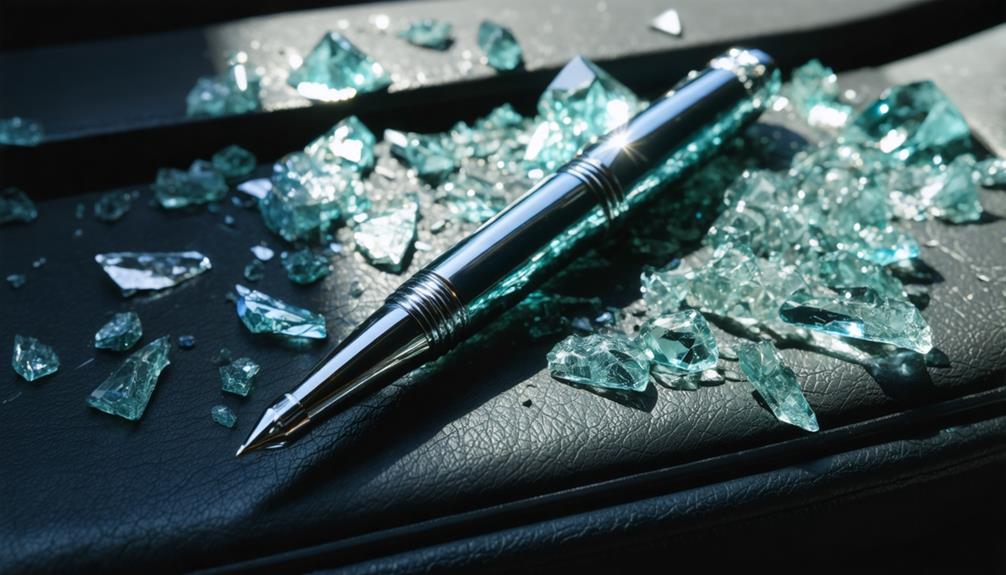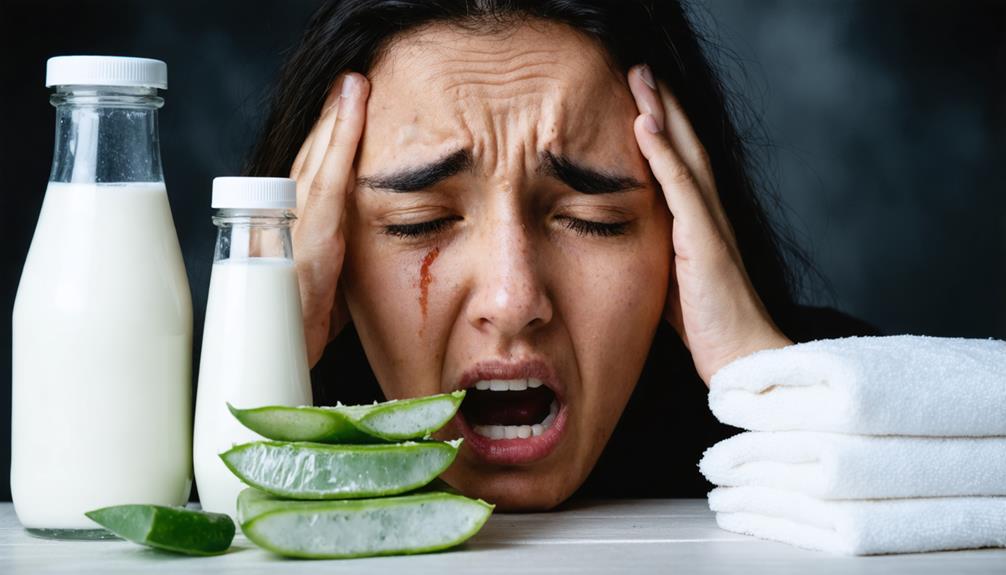
Brainstorm Security Shop

For Orders Over $199

On Any Of Our Products

Details On Refund Page
If you’ve ever experienced the stinging burn of pepper spray, you know how urgent it is to find relief. You can start by rinsing the affected areas with cool water and avoiding any rubbing that might worsen the irritation. Interestingly, dairy products can play a role in neutralizing the burn, and aloe vera might just soothe your skin. However, pepper spray burn is not jocke and knowing when to seek medical help is crucial, especially if symptoms escalate. Let’s explore these first aid techniques and preventive measures to ensure you’re prepared should an unfortunate incident occur.
What should you do immediately after being exposed to pepper spray burn?
First, find a safe place away from the spray’s source. You need to assess your condition and stay calm. If your eyes are affected, avoid rubbing them, as this can worsen the pain. Instead, try using soothing remedies like cold compresses or a clean cloth soaked in cool water. These can help ease the burning sensation and reduce inflammation.
For pain management, consider taking over-the-counter pain relievers, such as ibuprofen or acetaminophen, to help alleviate discomfort. If you’re experiencing significant irritation, seek medical attention promptly. Your health is a priority, and professionals can offer treatments that you mightn’t have access to at home.
If you have any skin exposure, you might want to apply soothing remedies like aloe vera gel, which can provide relief and promote healing. Keep your environment cool and ventilated, as heat can intensify the burning sensation. Remember, staying calm and acting quickly is crucial in managing the immediate effects of pepper spray exposure.
When you get pepper spray on your skin, rinsing with water is crucial for relief. Start applying water immediately to help wash away the irritant, aiming for at least 15 minutes of rinsing. This optimal duration minimizes the burning sensation and aids in your recovery.
Rinsing your skin with water immediately after exposure to pepper spray is crucial for alleviating the burning sensation. The sooner you start, the better. Use cool or lukewarm water instead of hot, as hot water can intensify the pain. Direct the water flow onto the affected area, ensuring it washes away the irritating chemicals.
If you have access to a cold compress, consider applying it after rinsing. The cold compress can further help in reducing inflammation and providing pain relief. Just make sure the compress isn’t too cold, as extreme temperatures could cause additional irritation.
While rinsing, avoid rubbing your skin, as this can push the irritant deeper and worsen the burning sensation. Instead, let the water flow gently over the area to effectively flush out the pepper spray.
If the burning persists, continue rinsing for several minutes, as immediate action can dramatically improve your comfort level. Remember, the key is to act fast to minimize the effects of the spray. Following these steps can make a significant difference in how you feel after an unpleasant experience with pepper spray.
After you’ve rinsed your skin with water, it’s important to know how long to continue this process for maximum relief. Aim to rinse for at least 15 to 20 minutes. This time frame allows the water to effectively wash away the pepper spray oils, reducing irritation and speeding up your healing process.
Use effective rinsing techniques, such as running water directly over the affected areas instead of wiping or rubbing. Wiping can spread the irritant, worsening the burn. Instead, let the water flow continuously, as this provides the best pain relief.
If you can, immerse the affected area in a basin of cool water. It helps to soothe the burn while ensuring thorough rinsing.
If you notice that the pain persists after the initial rinsing, don’t hesitate to continue rinsing for longer. The goal is to minimize the discomfort and avoid any lingering effects.
Once you’ve rinsed for the recommended duration, assess your skin. If irritation continues, consider seeking medical attention. Remember, the sooner you rinse, the better your chances for a smoother recovery.
Dairy products can be surprisingly effective in alleviating the burning sensation caused by pepper spray. When you’re in distress, reaching for a milk remedy can provide quick relief. Milk contains casein, a protein that binds with the capsaicin in pepper spray, neutralizing the heat and easing your discomfort. Just grab a glass, swish it around in your mouth, and swallow. You’ll likely feel a sense of relief almost immediately.
If you prefer a more solid option, consider a cheese solution. Cheeses, particularly those that are high in fat, can also help counteract the burning sensation.
You can chew on a piece of cheese or let it melt in your mouth to coat your tongue and throat. This will help lower the intensity of the burn.
Aloe vera is a soothing option for relieving pepper spray burns. This natural remedy boasts numerous aloe vera benefits that can help alleviate pain and irritation. When you apply aloe vera gel directly to the affected area, it provides a cooling sensation that can ease discomfort. Its anti-inflammatory properties work effectively to reduce redness and swelling, making it a popular choice for treating skin irritations.
To use aloe vera, simply slice open a fresh leaf to extract the gel. Apply it generously to the burn site, and let it absorb into your skin.
If you don’t have a plant, you can opt for store-bought aloe vera gel, but make sure it’s pure and free of additives. While there are alternatives like coconut oil or honey, aloe vera’s effectiveness in soothing burns is hard to beat.
If you experience severe reactions like difficulty breathing, intense swelling, or persistent pain after being pepper sprayed, it’s crucial to seek medical attention right away.
Don’t underestimate your symptoms; knowing when to visit a doctor can make all the difference in your recovery. Trust your instincts—if something feels off, get help.
While most people experience mild discomfort after exposure to pepper spray, certain signs indicate a severe reaction that requires immediate medical attention. If you notice difficulty breathing, chest tightness, or swelling in your face or throat, don’t hesitate—seek help right away. These symptoms can escalate quickly and may pose serious health risks.
Symptoms evaluation is crucial in determining the severity of your reaction. If you experience intense burning sensations that don’t improve with basic first aid measures, or if your eyes remain red and swollen for an extended period, you should address these issues urgently.
Other alarming signs include persistent coughing, wheezing, or any signs of an allergic reaction, such as hives or severe skin irritation. Don’t ignore these symptoms; they may indicate a need for professional treatment options.
Knowing when to seek medical attention after pepper spray exposure can be critical for your health. If you experience severe symptoms such as difficulty breathing, persistent vision problems, or intense skin burns, don’t hesitate to visit a doctor. A medical evaluation will help determine the best treatment options for your specific situation.
Here’s a quick reference to help you decide when to seek professional help:
| Symptom | When to Seek Help | Potential Treatment Options |
|---|---|---|
| Difficulty breathing | Immediately | Oxygen therapy, bronchodilators |
| Severe eye irritation | Within a few hours | Eye irrigation, topical medications |
| Skin burns | If blisters develop or pain persists | Prescription creams, pain relief |
| Prolonged symptoms | 24 hours after exposure | Further medical evaluation |
You know your body best, so listen to it. If symptoms worsen or don’t improve, a healthcare provider can offer more than just basic first aid. Don’t take chances with your health; seeking professional help can lead to effective treatment and faster recovery.
How can you effectively reduce the risk of pepper spray exposure? The best way to start is by investing in protective gear. Wearing goggles, masks, and long-sleeved clothing can shield your skin and eyes from irritation. If you find yourself in a situation where pepper spray might be used, make sure you’ve got this gear handy.
Another key preventive measure is avoiding exposure altogether. Stay away from potentially dangerous situations where pepper spray could be deployed, like crowded areas or protests. If you’re attending events where tensions run high, keep your distance from the center of the crowd.
If you’re in a location where pepper spray is used for self-defense, be aware of your surroundings. Position yourself so you’re not directly in the line of spray. Staying vigilant and prepared can significantly lower your chances of contact with this irritant.
Yes, pepper spray can cause long-term skin damage if not treated properly. You should focus on skin hydration and seek medical consultation if you experience persistent irritation or discomfort to ensure your skin heals correctly.
If you accidentally spray yourself, immediately rinse the area with water and soap. Apply first aid techniques like cool compresses. For prevention, always aim away from yourself and wear protective gear when using pepper spray.
Yes, there are natural remedies you can try. Aloe vera and honey can soothe irritation and help with preventing scarring. Apply them gently on the affected area for relief and better healing outcomes.
If you’re unsure about needing medical help, assess your symptoms. If they worsen despite first aid, or if you experience severe pain, difficulty breathing, or prolonged irritation, seek medical assistance immediately to ensure your safety.
Using ice packs can provide temporary relief, but their effectiveness may vary. You might also consider alternative remedies like aloe vera or milk to soothe the burn. Always monitor your symptoms and seek help if needed.
